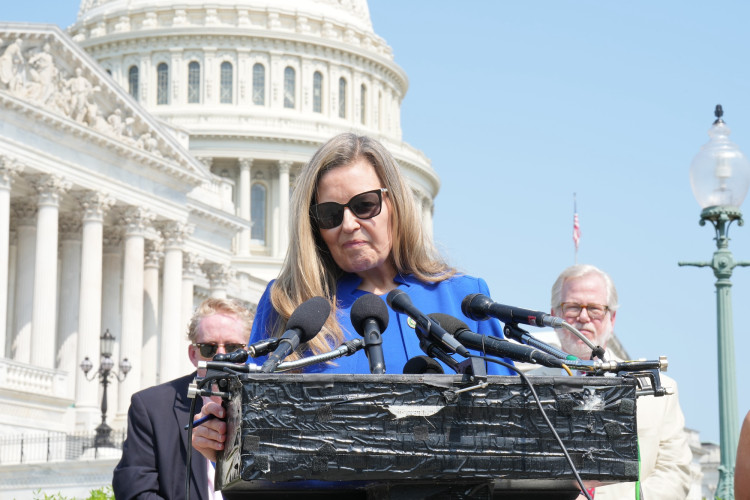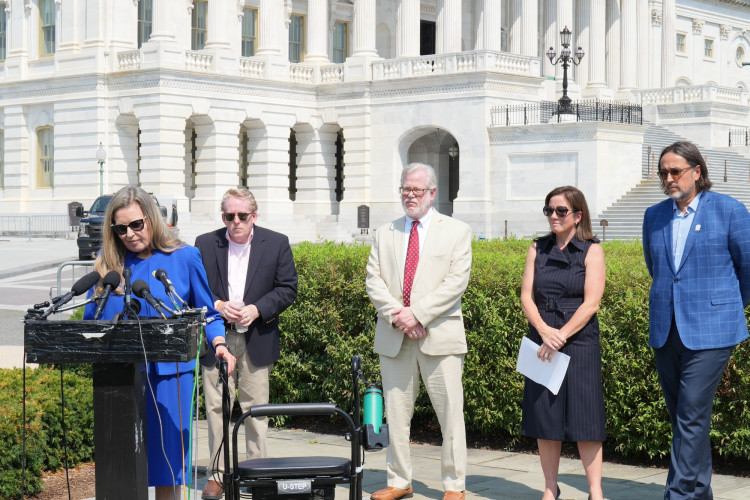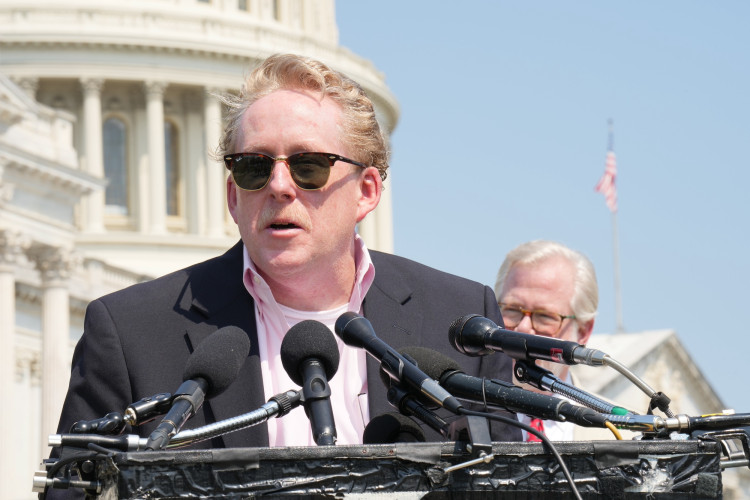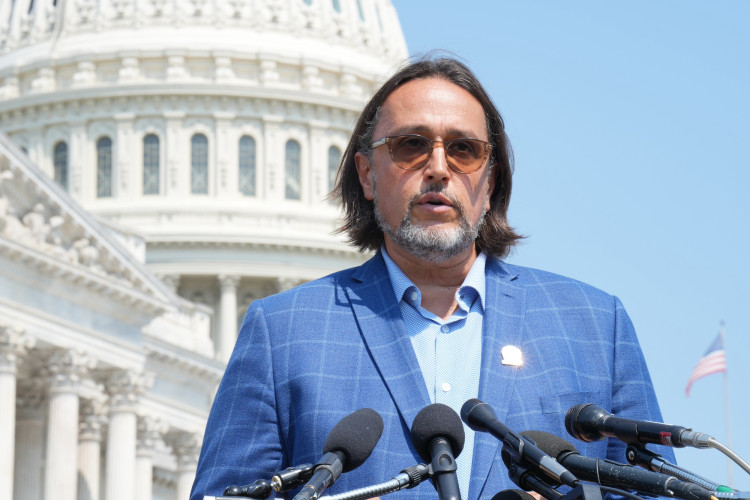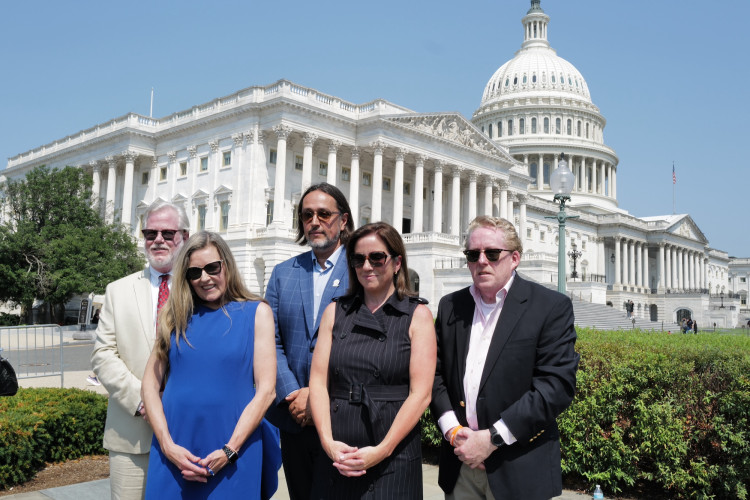From the Open-Publishing Calendar
From the Open-Publishing Newswire
Indybay Feature
Healthy Brain Act Introduced to Fight Degenerative Brain Disease
WASHINGTON (08-01) – Congresswoman Jennifer Wexton (D-VA) made history last month when she was the first member of Congress to give a floor speech using an AI clone of her voice that had been robbed from her as she suffers through Progressive Supranuclear Palsy (PSP) a rare and incurable brain disease that she has referred to as “Parkinson’s on steroids.” She also said that PSP has, in addition to having lost her ability to speak, also robbed her of the “ability to walk, run and dance.”
WASHINGTON (08-01) – Congresswoman Jennifer Wexton (D-VA) made history last month when she was the first member of Congress to give a floor speech using an AI clone of her voice that had been robbed from her as she suffers through Progressive Supranuclear Palsy (PSP) a rare and incurable brain disease that she has referred to as “Parkinson’s on steroids.” She also said that PSP has, in addition to having lost her ability to speak, also robbed her of the “ability to walk, run and dance.”
The lawyer and former Loudoun County prosecutor was first diagnosed with Parkinson’s disease in 2003 and later re-diagnosed in 2023 with PSP. While meeting this overwhelming challenge, Wexton has continued actively working in Congress while using a text-to-speech app and, recently, a new Augmentative and Alternative Communication (AAC) voice program modeled on old recordings of her speech in recreating her original voice for output.
Today using that voice, she introduced a new bipartisan effort called the Healthy Brains Act which she coauthored with Florida Rep. Gus Bilirakis (R-FL). During a morning news conference on Capitol Hill, she described the new act by saying that “The ideal tool to fight these diseases is by prevention and that is the goal of the Healthy Brains Act.”
Saying that there are not enough good answers as to why these diseases occur, Wexton said the bill would advocate for “greater resources to understand, diagnose, treat, and ultimately prevent these terrible illnesses.”
The bill would also investigate the causes of these diseases and how people become afflicted by them in considering environment factors as well as exposure to chemicals, one example of which is Trichloroethylene (TCE) that “has corresponded with a greater risk of Parkinson’s” used in dry cleaning, as an industrial degreasing solvent and in artworks.
In furtherance of such research, the bill would also direct the National Institutes of Health (NIH) to establish “Collaborative Centers for Neurodegenerative Disease Environmental Research to conduct and support basic, applied, and clinical research on the effects of environmental risk factors.”
Due to her untiring advocacy, an earlier bill, the “Dr. Emmanuel Bilirakis and Honorable Jennifer Wexton National Plan to End Parkinson’s Act,” was signed into law by President Biden in July. That bill supported by the Michael J. Fox Foundation and CurePSP is aimed at improving early diagnosis and in combating neurodegenerative diseases like Parkinson’s and Wexton’s PSP. The diseases combined currently affect over one million Americans and the bill’s passage would bring “…key federal agency stakeholders together along with nonfederal experts, patients, and caregivers to build a national plan to prevent, treat, and cure Parkinson’s Disease, including atypical Parkinsonisms like progressive supranuclear palsy (PSP).”
In closing, while backed by others affected by Parkinson’s and supporters of the legislation, she said “As I approach the end of my time serving in Congress, I often get asked about what I’d like my legacy to be. I like to tell people…that I want to be known as someone who made the most of her opportunity to serve her community and help people. And I hope that this bill today is going to be a big part of that.”
During the press conference, Rep. Wexton was joined by others, each of whom spoke of their involvement with degenerative brain diseases and their support for the passage of the Healthy Brains Act. The list includes Rick Grant who was diagnosed with Parkinson’s at age 54 in 2015 and has since worked with the Michael J. Fox Foundation, fellow Virginian Allie Signorelli diagnosed with Young Onset Parkinson’s disease at age 47, Ted Thompson, Senior Vice President of Public Policy at the Michael J. Fox Foundation and Kristophe Diaz, Ph.D., Executive Director and Chief Science Officer of CurePSP.
Report and photos by Phil Pasquini
© 2024 nuzeink all rights reserved worldwide
The lawyer and former Loudoun County prosecutor was first diagnosed with Parkinson’s disease in 2003 and later re-diagnosed in 2023 with PSP. While meeting this overwhelming challenge, Wexton has continued actively working in Congress while using a text-to-speech app and, recently, a new Augmentative and Alternative Communication (AAC) voice program modeled on old recordings of her speech in recreating her original voice for output.
Today using that voice, she introduced a new bipartisan effort called the Healthy Brains Act which she coauthored with Florida Rep. Gus Bilirakis (R-FL). During a morning news conference on Capitol Hill, she described the new act by saying that “The ideal tool to fight these diseases is by prevention and that is the goal of the Healthy Brains Act.”
Saying that there are not enough good answers as to why these diseases occur, Wexton said the bill would advocate for “greater resources to understand, diagnose, treat, and ultimately prevent these terrible illnesses.”
The bill would also investigate the causes of these diseases and how people become afflicted by them in considering environment factors as well as exposure to chemicals, one example of which is Trichloroethylene (TCE) that “has corresponded with a greater risk of Parkinson’s” used in dry cleaning, as an industrial degreasing solvent and in artworks.
In furtherance of such research, the bill would also direct the National Institutes of Health (NIH) to establish “Collaborative Centers for Neurodegenerative Disease Environmental Research to conduct and support basic, applied, and clinical research on the effects of environmental risk factors.”
Due to her untiring advocacy, an earlier bill, the “Dr. Emmanuel Bilirakis and Honorable Jennifer Wexton National Plan to End Parkinson’s Act,” was signed into law by President Biden in July. That bill supported by the Michael J. Fox Foundation and CurePSP is aimed at improving early diagnosis and in combating neurodegenerative diseases like Parkinson’s and Wexton’s PSP. The diseases combined currently affect over one million Americans and the bill’s passage would bring “…key federal agency stakeholders together along with nonfederal experts, patients, and caregivers to build a national plan to prevent, treat, and cure Parkinson’s Disease, including atypical Parkinsonisms like progressive supranuclear palsy (PSP).”
In closing, while backed by others affected by Parkinson’s and supporters of the legislation, she said “As I approach the end of my time serving in Congress, I often get asked about what I’d like my legacy to be. I like to tell people…that I want to be known as someone who made the most of her opportunity to serve her community and help people. And I hope that this bill today is going to be a big part of that.”
During the press conference, Rep. Wexton was joined by others, each of whom spoke of their involvement with degenerative brain diseases and their support for the passage of the Healthy Brains Act. The list includes Rick Grant who was diagnosed with Parkinson’s at age 54 in 2015 and has since worked with the Michael J. Fox Foundation, fellow Virginian Allie Signorelli diagnosed with Young Onset Parkinson’s disease at age 47, Ted Thompson, Senior Vice President of Public Policy at the Michael J. Fox Foundation and Kristophe Diaz, Ph.D., Executive Director and Chief Science Officer of CurePSP.
Report and photos by Phil Pasquini
© 2024 nuzeink all rights reserved worldwide
For more information:
https://www.facebook.com/media/set/?vanity...
Add Your Comments
We are 100% volunteer and depend on your participation to sustain our efforts!
Get Involved
If you'd like to help with maintaining or developing the website, contact us.
Publish
Publish your stories and upcoming events on Indybay.
Topics
More
Search Indybay's Archives
Advanced Search
►
▼
IMC Network


